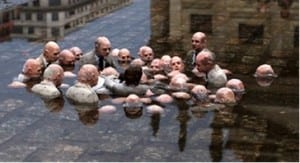Right Here, Right Now (with apologies to FatBoy Slim)
By Clive Shrubsole, on 20 October 2015
19 – 25 October marks the inaugural Global Climate Change Week (#GCCW). GCCW is a new initiative designed to encourage academics in all disciplines and countries to engage with their students and communities on climate change action and solutions. UCL IEDE, UCL-Energy, UCL ISR and UCL ISH academics and students will be holding events and blogging through the week to share thoughts and ideas for the future.
The fact is: climate change is a fact. The science behind climate change and the ongoing evidence is now so overwhelming, that it seems to me that some active climate change deniers are a bit like members of the flat earth society, holding on to an increasingly delusional view despite all the proof to the contrary.. Some continue to deny the science publically, while acknowledging it privately due to a powerful vested interests that they feel could suffer should it be acknowledged.
 A recent article published following the analysis of hundreds of internal documents and printed materials, showed that for more than 20 years the oil company Exxon tried to cast doubt on the science of climate change, while at the same time factoring climate change calculations into its planning for oil operations in the Arctic. They concluded that searching for oil and gas would be made easier as sea ice melted due to warmer ocean temperatures, one of the effects of climate change.
A recent article published following the analysis of hundreds of internal documents and printed materials, showed that for more than 20 years the oil company Exxon tried to cast doubt on the science of climate change, while at the same time factoring climate change calculations into its planning for oil operations in the Arctic. They concluded that searching for oil and gas would be made easier as sea ice melted due to warmer ocean temperatures, one of the effects of climate change.
In addition there is often a mismatch of language. For the person in the street, ‘very likely’ has a different meaning compared to a scientist for whom it means above a 90% level of certainty. Climate scientists now believe it is “extremely likely” (95% certainty) that warming of the Earth’s climate is caused by humans, marking a rise in confidence from “very likely” in 2007, which in layman’s terms means they are very sure. Whilst there is uncertainty around how the climate is responding to the enormous changes taking place, being uncertain is totally different to being unsure and scientists are remarkably sure. The problem is that scientists simply cannot disentangle the complex web of cause and effect with absolute certainty for a particular event.
Add to this mix, the fact that the message implicitly calls for upheaval and change (and who honestly welcomes change) and you can see people moving to stick their fingers in the ears in an ‘I can’t hear you’ motion. As you look at the window at the sunshine, with birds in the sky and leaves still on the trees the reality of climate change can seem very distant form our day to day experience.
To counter this we need to create proximity. The emphasis has to be that climate change is happening, it’s happening here and it’s happening now. One of the causes of current inertia is that we create distance by framing climate change as a threat in the future. We talk of impacts on biodiversity and species extinction and numerous other ‘non-human’ threats. When we talk about a sense of loss, we are looking backwards, whereas climate change projects those losses into the future. We are evolved to deal with immediate and present threats, but seem very slow to respond to a gradual moving change.
What is clear however, is that this is a fast-moving issue and the impacts of climate change are gaining momentum and catching up with the narrative. At the moment we still sit on the cusp, anticipating change, but without seeing the major impacts. Have no doubt, momentous shifts are under way in the world’s climate systems and carbon cycles, which will, within a single lifetime, make climate change entirely real, and unavoidable. This will be a new world in which past uncertainties will disappear in the face of irrefutable evidence. How we respond now, shapes that future. Cooperation and acceptance will result in very different outcomes to denial and blame.
As scientists I feel we have a duty to communicate the evidence in a clear unambiguous manner through all forms of media and to keep on communicating whatever the response; not for our own sakes but in order to secure a better future of which we may not be a part.
Image: A sculpture by Spanish street artist Isaac Cordal dubbed ‘Politicians discussing global warming’ by social media.
One Response to “Right Here, Right Now (with apologies to FatBoy Slim)”
- 1
 Close
Close



[…] policy makers into looking at only certain types. Clive has written two articles on related topics: the invisible scale of Climate Change and the need for a new clean air […]